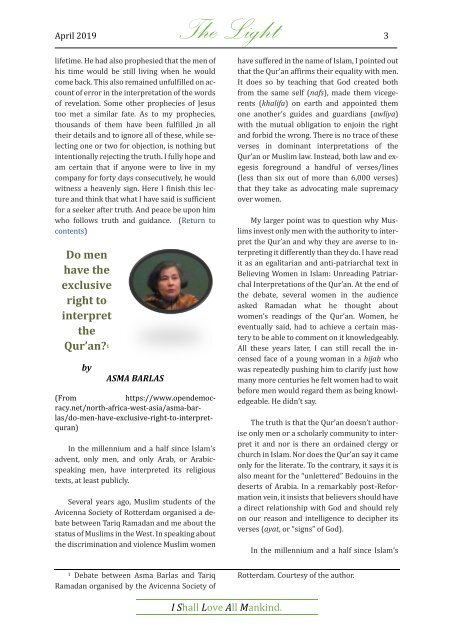The Light April 2019 04
Monthly magazine of the Ahmadiyya Association for the Propagation of Islam. Propagating Islam as taught by the Holy Prophet Muhammad (s) - peaceful, loving, inclusive and rational which teaches respect for the followers and founders of all religions.
Monthly magazine of the Ahmadiyya Association for the Propagation of Islam. Propagating Islam as taught by the Holy Prophet Muhammad (s) - peaceful, loving, inclusive and rational which teaches respect for the followers and founders of all religions.
Create successful ePaper yourself
Turn your PDF publications into a flip-book with our unique Google optimized e-Paper software.
<strong>April</strong> <strong>2019</strong> <strong>The</strong><br />
<strong>Light</strong> 3<br />
lifetime. He had also prophesied that the men of<br />
his time would be still living when he would<br />
come back. This also remained unfulfilled on account<br />
of error in the interpretation of the words<br />
of revelation. Some other prophecies of Jesus<br />
too met a similar fate. As to my prophecies,<br />
thousands of them have been fulfilled in all<br />
their details and to ignore all of these, while selecting<br />
one or two for objection, is nothing but<br />
intentionally rejecting the truth. I fully hope and<br />
am certain that if anyone were to live in my<br />
company for forty days consecutively, he would<br />
witness a heavenly sign. Here I finish this lecture<br />
and think that what I have said is sufficient<br />
for a seeker after truth. And peace be upon him<br />
who follows truth and guidance. (Return to<br />
contents)<br />
Do men<br />
have the<br />
exclusive<br />
right to<br />
interpret<br />
the<br />
Qur’an? 1<br />
by<br />
ASMA BARLAS<br />
(From<br />
https://www.opendemocracy.net/north-africa-west-asia/asma-barlas/do-men-have-exclusive-right-to-interpretquran)<br />
In the millennium and a half since Islam’s<br />
advent, only men, and only Arab, or Arabicspeaking<br />
men, have interpreted its religious<br />
texts, at least publicly.<br />
Several years ago, Muslim students of the<br />
Avicenna Society of Rotterdam organised a debate<br />
between Tariq Ramadan and me about the<br />
status of Muslims in the West. In speaking about<br />
the discrimination and violence Muslim women<br />
have suffered in the name of Islam, I pointed out<br />
that the Qur’an affirms their equality with men.<br />
It does so by teaching that God created both<br />
from the same self (nafs), made them vicegerents<br />
(khalifa) on earth and appointed them<br />
one another’s guides and guardians (awliya)<br />
with the mutual obligation to enjoin the right<br />
and forbid the wrong. <strong>The</strong>re is no trace of these<br />
verses in dominant interpretations of the<br />
Qur’an or Muslim law. Instead, both law and exegesis<br />
foreground a handful of verses/lines<br />
(less than six out of more than 6,000 verses)<br />
that they take as advocating male supremacy<br />
over women.<br />
My larger point was to question why Muslims<br />
invest only men with the authority to interpret<br />
the Qur’an and why they are averse to interpreting<br />
it differently than they do. I have read<br />
it as an egalitarian and anti-patriarchal text in<br />
Believing Women in Islam: Unreading Patriarchal<br />
Interpretations of the Qur’an. At the end of<br />
the debate, several women in the audience<br />
asked Ramadan what he thought about<br />
women’s readings of the Qur’an. Women, he<br />
eventually said, had to achieve a certain mastery<br />
to be able to comment on it knowledgeably.<br />
All these years later, I can still recall the incensed<br />
face of a young woman in a hijab who<br />
was repeatedly pushing him to clarify just how<br />
many more centuries he felt women had to wait<br />
before men would regard them as being knowledgeable.<br />
He didn’t say.<br />
<strong>The</strong> truth is that the Qur’an doesn’t authorise<br />
only men or a scholarly community to interpret<br />
it and nor is there an ordained clergy or<br />
church in Islam. Nor does the Qur’an say it came<br />
only for the literate. To the contrary, it says it is<br />
also meant for the “unlettered” Bedouins in the<br />
deserts of Arabia. In a remarkably post-Reformation<br />
vein, it insists that believers should have<br />
a direct relationship with God and should rely<br />
on our reason and intelligence to decipher its<br />
verses (ayat, or “signs” of God).<br />
In the millennium and a half since Islam’s<br />
1 Debate between Asma Barlas and Tariq<br />
Ramadan organised by the Avicenna Society of<br />
Rotterdam. Courtesy of the author.<br />
I Shall Love All Mankind.














